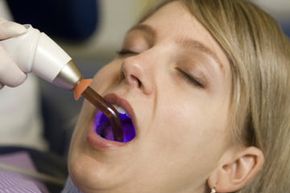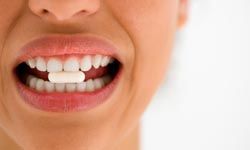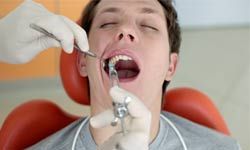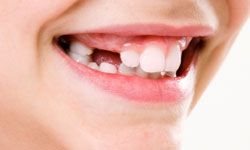As part of the digestive system in the human body, the teeth are one of the first points of contact from mouth to stomach. Teeth break apart foods and start the process of digestion that continues on down to the belly and beyond. When teeth aren't working well together at getting food crushed, other body parts, acids and fluids have to step it up and compensate, leading to belly aches and digestive pains. Keeping teeth in good working order, however, also can lead to some stomach upset. In many ways, it's all connected.
Dental work includes all of the cleaning, filling, restoring and other procedures performed in a dentist's office, and almost all of the time, activity is centered in the mouth alone. There is stretching, biting, drilling and rinsing as well as pulsing, filing and painting -- none of which involves a person's stomach, but all of which can have an effect on how the stomach feels. Sometimes even thinking about going to the dentist can make your teeth hurt, but what about your stomach?
Advertisement
Anxiety and stress wrapped into dental fears may cause bellyaches before a dentist appointment. Opening wide for the work during a session might lead to gagging, choking, and swallowing debris and fluids, and foreign matter in the throat and stomach is a recipe for discomfort upset. All of the jaw tension, Novocaine and pain can linger with a patient after a dental appointment, bringing a queasy, uneasy nauseousness with it. And, chewing may be less efficient after dental work as numbness wears off and jaws resettle into a comfortable position, during which time food may not be chewed as well, leading to more stomach upset.
Some people experience little or no stomach issues in connection with dentistry, but others know it's an inevitable part of caring for teeth. Can dental work itself cause an upset stomach, or is it just the body's response and how we handle all of the activity and instruments in our mouths? Why are some prone to it and others immune?
Next we'll look at how righting your teeth can upset your stomach.
Advertisement




